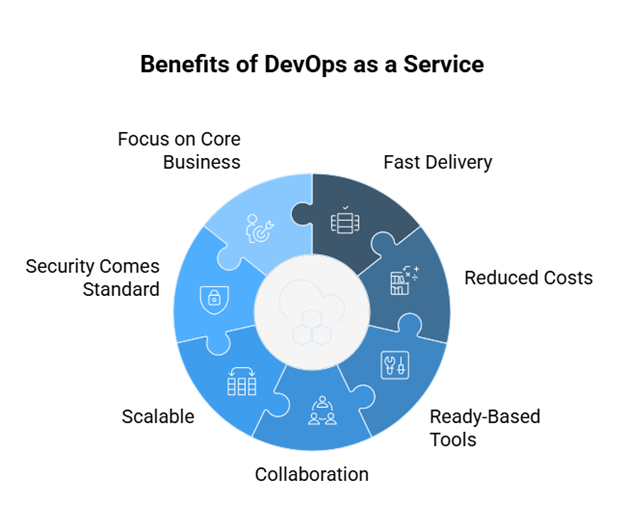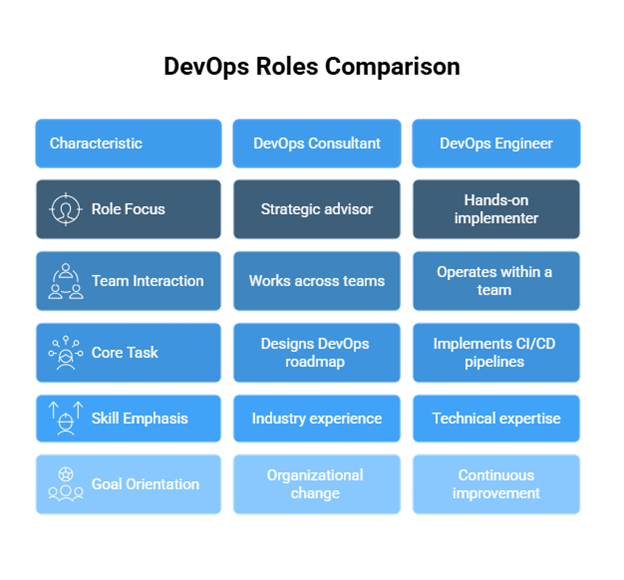DevOps Consulting Company vs In-House Team: Which Is Better for You?

A tough choice lies between choosing a DevOps consulting company and building an in-house team. Both help to improve processes of building, testing, and launching software, but in distinct ways. Growing up the business, saving time, or cutting costs would help you know what suits you best.
Simply put, a DevOps consulting company brings knowledge and toolsets that are tried and tested by many businesses. They will give you a quick start and help you avoid common mistakes. You will not have to incur the costs of hiring an entire DevOps team or spending months setting one yourself up.
Apart from their challenges, they also have their advantages. Your company’s requirements determine the one that suits you, your budget, and how quickly you expect to move. This article will explain these two options, allowing you to see which suits your business.
Table of Contents
What is DevOps as a Service?
DevOps as a Service (DaaS) is the way forward to modernize businesses, providing them with DevOps perks like speed, automation, and collaboration without the pain of building everything from scratch. In cases where you either do not want to hire a full team or manage crashing tools, you may simply rely on a consulting firm that will handle everything for you.
With growing interest in DaaS, here are some reasons:

Fast Delivery: Automation and smooth pipelines accelerate development, testing, and deployment speeds.
Reduced Costs: You pay neither for expensive tools nor full-time DevOps engineers.
Ready-Based Tools: Providers offer pre-configured toolchains thoroughly tested for vigorous implementation.
Collaboration: DaaS helps break silos and compromise between Development and Operations to enhance productivity.
Scalable: Depending on project demands, you can easily scale up or down with no long-term obligation.
Security Comes Standard: Several providers roll security and compliance into their general offerings.
Focus on Core Business: Keep your eyes on your goals and let the experts handle the backend.
Read More : Top 10 Benefits of Partnering with an Azure DevOps Consulting Company
What Does a DevOps Consultant Do?
Consultant providing outsourced DevOps services helps modernize how a company develops, tests, and releases software. They bring the ability to think strategically and to enter into and execute a plan to fine-tune workflows and speed delivery.

1. Assessing Your Current Setup
The engagement always begins with assessing your current state. The DevOps consulting company assesses how you currently perform your development and operations workflows to identify delays, gaps, and inefficiencies. This assessment becomes the foundation of your DevOps journey.
2. Creating a DevOps Roadmap
After clearly defining the problems, consultants prepare a roadmap. It would include well-defined steps, reasonable timelines, and a recommended toolchain suited to your business objectives. The DevOps consulting company ensures that every solution is custom-designed for your strengths and challenges, not a cookie-cutter, one-size-fits-all template. This is the breadth of a full DevOps consulting service tailored for long-term thriving.
3. Pipeline Automation
Automation is the key to DevOps’s success. The consulting service sets up CI/CD pipelines using Jenkins, GitHub Actions, or GitLab CI tools. They also deploy Infrastructure as Code (IaC) with Terraform, etc., to automate infrastructure provisioning, eliminating manual errors and maintaining consistency across environments.
4. Improving Security and Monitoring
A good consulting firm builds security with every step: Enter DevSecOps. They also implement observability solutions using Prometheus, Grafana, or Datadog to monitor performance, identify issues at an early stage, and subsequent maintenance of system health. Backed by an experienced DevOps consulting company, your software delivery remains safe and resilient.
5. Cultural Shift
DevOps is not just a toolkit but a profoundly people-driven culture change. Consultants foster collaboration between dev and ops, provide intensive training, and lead cultural transformation. Putting people first creates a culture where DevOps evolves into a way of life.
6. Real-world Use Cases
Consultants in a DevOps consulting company deliver real value, from outsourcing some DevOps solutions to large-scale cloud migrations that enable teams to automate repetitive mundane tasks, simplify release processes, and focus on value creation rather than firefighting.
7. Long-Term Value
The DevOps consulting company with a seasoned background offers far beyond quick wins. They will help build a resilient and scalable system that can freely innovate yet remain reliable, secure, and fast.
Choose Smarter: Consult Our DevOps Team
What is the Difference Between a DevOps Engineer and a DevOps consultant?

The roles of a DevOps consulting company and a DevOps engineer are complementary yet remain distinct. A DevOps consultant performs the strategic project advisory across teams or departments to analyze present workflows, note deficiencies, design a roadmap for DevOps adoption unique to the environment, and bring a higher perspective of general best practices in the industry along with toolchains and strategies for cultural transformation, often with leadership for long-term change. The emphasis is on planning, coaching, and aligning DevOps activities with the business directions.
On the contrary, a DevOps engineer works hands-on and is deeply involved in day-to-day operations. Such engineers implement CI/CD pipelines, maintain infrastructure such as Code (IaC) to automate infrastructure setup and deployment, configure monitoring tools, and ensure deployment reliability. They assist developers and operations teams in building and maintaining the actual systems supporting DevOps.
Consultants from a reliable DevOps consulting company are there to provide advice and design strategy, while engineers are responsible for implementing and maintaining the required infrastructure. Both roles are critical for the successful adoption of DevOps.
DevOps Team vs DevOps Consultant – A Practical, Point-by-Point Comparison
| Category | Consultant | In-House Team |
| 1. Setup Speed | A DevOps consulting company performs for speed. Through established methodology, reusable frameworks, and scripts ready for automation, they almost immediately begin to provide value. This is especially relevant for organizations that want to begin a cloud migration or set up CI/CD without delay. | Candidates must be hired, onboarded, and trained, which can take weeks or months. Then, the teams must set out to define processes, evaluate tools, and build a DevOps culture from scratch, all of which further delay implementation. |
| 2. Cost and Budget Structure | Consultants are usually engaged flexibly: hourly, monthly, and project based. You pay only for what you need and when you need it, with no long-term financial commitment nor any costs that would go into the benefits of employees, infrastructure, or tools. | An internal team brings fixed costs, i.e., four walls inside which salaries, benefits, tools, licenses, and training reside. These costs are constant regardless of whether the project workload is too high or too low. Holding on to an internal team can become a long-term financial commitment for companies working with tight or variable budgets. |
| 3. Depth of Expertise and Tools | A DevOps consulting company, due to working with multiple tools, environments, and client needs, has a more diversified portfolio, which makes them better prepared to deal with the real issues confronting companies. For Kubernetes orchestration, GitOps setup, or Azure DevOps implementation, the consultants have done it more than once and polished their approach. | Internal engineers might have a great understanding of the company’s architecture, but there can be weaknesses, so to speak, in that they might not have exposure to the newer tools or frameworks. Training the team is an investment of both time and money. |
| 4. Scalability | When it comes time to scale, for a product release or migration project, adding additional development resources from the outside is simple and quick. Once the demand has been met, scaling down becomes easy. This is perfect for companies that see a lot of development activity in bursts. | Scaling internally means hiring, training, and managing additional employees. This is very expensive and time-consuming. However, if no employees are scaling down, it is bound to hurt the morale of those who remain in the company, and connectivity may be lost. |
| 5. Automation and Delivery Maturity | Seasoned DevOps consultants come equipped with automation patterns that are ready to be implemented. They can now help in the build-out of CI/CD pipelines, infrastructure-as-code, and test workflows with the first-best practice implementation, diminishing mistakes introduced by manual intervention and speeding up delivery. | An internal team might have to go through the tooling, test manual integrations, and set up manual Builds of the automation. This would set long precedents for the results, and the system’s iteration may create some instability in the early days. |
| 6. Focus and Internal Productivity | A DevOps consulting company focusing on infrastructure, deployment, and release management allows your internal engineering teams to concentrate on product development and business features. This lets the teams iterate quicker and deliver better user experiences. | In-house DevOps engineers are often asked or required to multitask across security, maintenance, configuration, development support, troubleshooting, and other familiar roles. Relative fragmentation of attention and focus always affects productivity and potential burnout, which is most pronounced in small teams. |
| 7. Risk and Security Management | A DevOps consulting company has predefined playbooks for security and compliance knowledge. According to global standards, building resilient systems with rollback strategies, vulnerability scanning, and infrastructure hardening is a norm for them. | Internal teams may spend some time defining and implementing proper risk and security guidelines. When immature within the regulatory environment, they can suffer manifest risks to their projects that get overlooked until they land in the middle of a catastrophe. |
| 8. Innovation and Competitive Edge | Consultants ensure a competitive edge for their clients by constantly interacting with new tooling and methodologies across diverse industries and projects. They usually work with future-proof practices like GitOps, serverless CI/CD, or AI-based monitoring. | Internal teams usually keep things stable and rarely get a chance to experiment. Without intra- or extra-R&D and benchmarking, innovation can quickly wither away, leaving the company far behind its competitors. |
| 9. Integration with Company Culture | There might be a lag between external resources aligning with internal processes, communication styles, and decision-making structures. However, experienced consultants from a renowned DevOps consulting company are usually relatively quick to adapt once introduced adequately and engaged with stakeholders. | Internal engineers have a good grasp of the culture, stakeholder preferences, team dynamics, and organizational goals, a step of collaboration that only gets better over time. |
| 10. Long-Term Ownership | The consultants can build the foundations and slowly hand them to the internal team. At the same time, many can even have enablement plans and training as part of an exit strategy to ensure long-term sustainability. | Once the systems are in place, internal teams are better suited for continuous improvement and platform ownership. They can maintain and iterate on DevOps practices in a full business context. |
The Future of DevOps: Key Trends Shaping What’s Next
The need for rapid and secure software development in increasingly collaborative environments has ensured a rapidly evolving DevOps. Here is a simplified breakdown of what the future holds:
1. Market Growth Ahead :
The global DevOps market is set to grow massively by 2028 as businesses demand faster software delivery and smoother deployment.
2. AI and Machine Learning :
AI/ML will turbocharge DevOps with capabilities like predictive analytics, intelligent monitoring, automated testing, and AI-driven security tools.
3. Cloud-Native and Serverless :
New-generation DevOps integrates deeply with cloud platforms and microservices for faster updates, better scalability, and less downtime. To get the best results it is best to consult DevOps consulting company.
4. Rise of DevSecOps :
Across DevOps pipelines, security is integrated every step of the way as a shift from being an afterthought to a primary focus.
5. Increased Automation :
More than ever before, the manual will be lessened. Automation will take care of testing, deployments, monitoring, and even probing issue resolution.
6. DevOps Skills Demand :
With a growing adoption, DevOps professionals with skills are in high demand across industries.
7. Bridging between the Teams :
This interface will fade between development and operations, fostering collaboration and bilateral goals.
8. Continuous Improvement Culture :
DevOps fosters a culture of constant feedback, learning, and iteration for better software with every release.
Azure DevOps vs. AWS vs. Google Cloud: Feature-by-Feature Comparison
| Category | Azure DevOps | AWS | Google Cloud |
| 1. Tool Integration | Provides seamless integration with Microsoft tools such as GitHub, Visual Studio, Teams, and other Azure services. | Inside AWS, it works fine, excluding smooth integration with many third-party apps. | Restricted to GCP-native tools and other integrations require hard work. |
| 2. CI/CD Pipelines | Azure Pipelines provide cross-platform support, integrating with GitHub and scalable automation. | Code Pipeline and other related tools are potent and require the configuration done by hand. | Cloud Build offers more speed but lacks customizations for complex workflows. |
| 3. Project Management & Collaboration | Azure Boards support agile planning, backlog management, and sprint tracking. | No built-in project tracking; third-party tools required. | This does not provide built-in project management features. |
| 4. Security & Compliance | RBAC, identity management, and compliance with ISO, HIPAA, and FedRAMP are all strong in Azure. | Security is excellent but requires an extra setup for DevOps tools. | Good controls but fewer enterprise-grade compliance features. |
| 5. Container & Kubernetes Support | Deep integration stands between AKS and Docker, Helm. | EKS and ECS sit tightly but are relatively complex to configure. | GKE is second to none, with less in-built DevOps toolchain depth. |
| 6. Learning Curve & Usability | Developers need a smooth infrastructure, UX, and ample documentation to make adoption easy. | Tough learning curves and fragmented tooling experience. | Easy to get into but lacks depth for advanced DevOps. |
| 7. Multi-Cloud Support | Facilitates multi-cloud deployments and integrates well with AWS, GCP, and on-prem systems. | More AWS-native infrastructure. | Kubernetes help but lacks hybrid/multi-cloud environment support. |
Conclusion
In today’s fast-paced digital landscape, there’s little time to debate whether a DevOps strategy is necessary. But should DevOps rely on an in-house team or an external expert team? Regardless of the approach, the goal remains the same: faster releases, improved collaboration, and greater reliability.
DevOps consulting services, fuelled by cloud-native tools such as Azure, AWS, and Google Cloud, provide a way for companies, whether they are big or small, to transform into this. Each has its set of tools to offer, but the variability lies in whom you choose as your partner.
When it comes to maximum flexibility, quick rollouts, and sustainable success, the winner will always be the DevOps consulting company you entrust. If you are looking for one, you can visit us here.
Frequently Asked Questions
Q1: What does a DevOps consultant do?
The consultant starts by examining the existing system, tools, and resource utilization to identify areas that require improvement. Based on these insights, they built a customized DevOps roadmap that engineers can then use to optimize developers’ workflows and improve efficiency. If you are searching for experienced Azure DevOps service providers, do not hesitate to contact us.
Q2: What is the difference between managed services and DevOps?
Managed services scale on demand: resources are automatically adjusted as demand changes. Platforms like Azure DevOps could also provide scaling solutions under different deployment environments, which typically results in decreased time to release and improved time to deployment. If you want managed DevOps services, do not hesitate to contact us today.
Q3: What is the difference between a DevOps engineer and a DevOps consultant?
One of the prominent differences between DevOps consultant vs DevOps engineer is project engagement. DevOps consultants typically work within several organizations, depending on the different project scope of the business. They mainly focus on designing and implementing DevOps’ strategy, setting up the systems, and enabling those teams before moving on to the next engagement. On the contrary, DevOps engineers are generally in teams or companies on a long-term basis. They maintain, improve, and support implementations of their DevOps environment to ensure continuous delivery and operational stability.
Recent Posts
- CI/CD with Azure DevOps: A Practical Guide to Designing Secure and Reliable Pipelines
- When Do Businesses Need Azure Cloud Management Services? Key Signs and Use Cases
- When Should Businesses Bring Azure Cloud Engineer for Azure Projects?
- The Role of an Azure Migration Consultant After Go-Live: Optimization, Security, and Cost Control
- Common Azure DevOps Challenges and How Consulting Experts Solve Them
















